Elevate Humanity: Support The Arts!
“Squeeee!”
That was my reaction when Julie Nesrallah, the host of Tempo on CBC Radio, said she was about to play Rimsky-Korsakov’s “Scheherazade”.
Scheherazade is one of my favourite pieces of classical music. When it plays, I soar. I am lifted out of myself to float along currents of enchantment.
When I’m driving, as is often the case when I listen to Tempo, this is problematic. My foot tends to press down on the gas pedal the more immersed I become in the music!
This transcendence, this plug-in to bliss, emphasizes the power of art to shape, teach, transform, heal, and comfort. These attributes are what we need more than ever as we all struggle to grapple with the consequences of the global pandemic.

Galway Street Club, Dublin, Ireland, 2016
Our focus as individuals, families, and communities is on surviving. The focus of governments is on managing health systems and restoring economies. However, to ensure the well-being of society and the well-being of each of us, we need to support creative expression. We need to ensure that the arts thrive.
Unfortunately, arts and culture seldom register as a voting issue during election campaigns, such as the one currently underway in British Columbia. When cast alongside health, housing, and jobs, arts and culture drop down the list of priorities as seemingly, relatively trivial.
I understand why that happens and yet I feel the tendency to do so is misguided. Embedding art in all that we do enriches our experiences, enhances our daily lives, and elevates our humanity. As such, it’s critical that we push our political parties to include support for the arts in their platforms and our elected officials to invest in the arts, especially to facilitate the inclusion of the arts in education, in schools and in the curriculum.
To win the argument for the importance of the arts, professional performance arts organizations often deploy and rely on economic arguments to secure sponsorships and donations. It is true that arts organizations function as economic engines. They employ a wide array of people and generate spending in a number of business sectors. As such, this is an important argument to make especially in a world that justifies investments by returns in dollars and cents. In our current times though the pandemic mitigates the effectiveness of such arguments. We need to emphasize, as we always should do, that investing in the arts is about more than the bottom line of tangible, monetary effects.
It is important to note that arguing for government support of the arts is not the same as advocating for state-sponsored culture. The latter is about nourishing the arts and the latter is about promulgating propaganda. That is why support of the arts should not be contingent on government funding alone. The arts will only survive with individual and community support. We each carry a measure of personal responsibility to ensure that artists and arts organizations have the space, time, and resources to flourish and create.
I also believe that the definition of what constitutes art must be inclusive, expansive, and generous. It is not about creating hierarchical preferences for one art form or the other or privileging the art of certain groups and a few voices. For example, people tend to label opera as elitist and yet opera, fundamentally, is about the human voice and the power of the voice does not depend on costumes, sets, and large venues. Some of the most profound experiences I have had with opera have been in intimate gatherings with no staging to distract from the singer’s voice.
Opera is not an elite art form. It is typically available to only a few because professional opera productions are expensive to stage. That is why the survival of opera as an art form in its professional incarnation depends on government, corporate, and individual support. More importantly, it is crucial for opera companies to invite audiences in with programmes that enhance affordability and to venture out to meet audiences with community-based initiatives.
Support for the arts is about elevating horizons and expanding visions. Art in all its forms should never be a privilege which only a few enjoy and it should never be seen as a talent which only a few can exercise. Creative expression is in all of us and it is for all of us. It is a bridge to building community and understanding. It is a celebration of diversity. It is a path to better.
Art is what makes our spirits soar and our hearts sing.
It makes us more than.
Support the arts in these bleak times. Financially if and when you are able to, with your time and attention if you cannot, because that song, that book, that drawing, that moment of creativity captured in whichever art form you enjoy is a spark of hope.
Reema this is such a well-rounded article.Its coming from your heart while placing the arts in context of what makes us human and keeps us whole.Your mom woul be shedding tears of joy
I’m so glad you are a mom and can play that very personal role as well as the doing the work you do in the wider world.
Thank you so much for your very kind words Lois and for taking the time to read the post! I know what a wonderful supporter of the arts you are and I am grateful for all that you do. I feel like you’ve sent me a hug directly from Mom and it has made this grey day brighter!